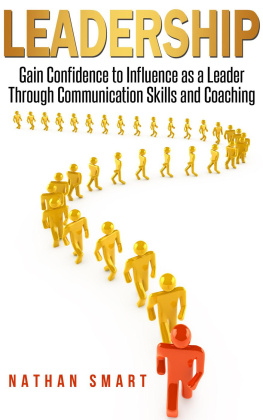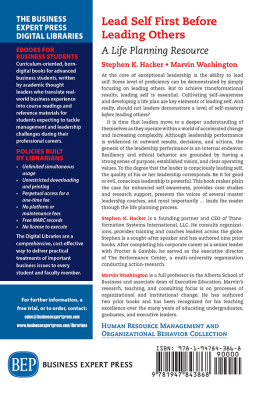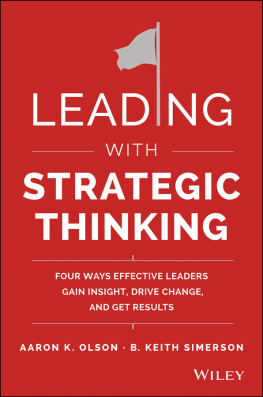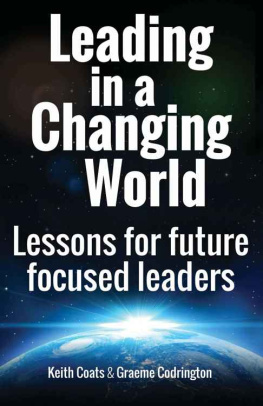Lead More, Control Less
Lead More, Control Less
8 Advanced Leadership Skills That Overturn Convention
Marvin Weisbord Sandra Janoff

Lead More, Control Less
Copyright 2015 by Marvin Weisbord and Sandra Janoff
All rights reserved. No part of this publication may be reproduced, distributed, or transmitted in any form or by any means, including photocopying, recording, or other electronic or mechanical methods, without the prior written permission of the publisher, except in the case of brief quotations embodied in critical reviews and certain other noncommercial uses permitted by copyright law. For permission requests, write to the publisher, addressed Attention: Permissions Coordinator, at the address below.
|
|---|

|
Berrett-Koehler Publishers, Inc. 1333 Broadway, Suite 1000 Oakland, CA 94612-1921 Tel: (510) 817-2277, Fax: (510) 817-2278 www.bkconnection.com |
Ordering information for print editions
Quantity sales. Special discounts are available on quantity purchases by corporations, associations, and others. For details, contact the Special Sales Department at the Berrett-Koehler address above.
Individual sales. Berrett-Koehler publications are available through most bookstores.
They can also be ordered directly from Berrett-Koehler: Tel: (800) 929-2929; Fax: (802) 864-7626; www.bkconnection.com
Orders for college textbook/course adoption use. Please contact Berrett-Koehler: Tel: (800) 929-2929; Fax: (802) 864-7626.
Orders by U.S. trade bookstores and wholesalers. Please contact Ingram Publisher Services, Tel: (800) 509-4887; Fax: (800) 838-1149; E-mail: for details about electronic ordering.
Berrett-Koehler and the BK logo are registered trademarks of Berrett-Koehler Publishers, Inc.
First Edition
Paperback print edition ISBN 978-1-62656-412-1
PDF e-book ISBN 978-1-62656-413-8
IDPF e-book ISBN 978-1-62656-414-5
2015-1
Cover design by Kirk DouPonce, DogEared Design. Interior design and composition by Gary Palmatier, Ideas to Images. Elizabeth von Radics, copyeditor; Mike Mollett, proofreader; Rachel Rice, indexer.
Contents
Why This Book?
THERE ARE THOUSANDS OF BOOKS DEFINING LEADERSHIP as planning, organizing, motivating, and controlling. Here we offer you a nontraditional perspective that you are unlikely to find elsewhere. We do not intend it to replace whatever works for you. Rather we see these eight skills as additive. They upend conventional practices, giving you leadership options you may not know you have. We will show you how to achieve superior results while reducing your need to control. Paradoxically, you may gain more control than before. Whether you work in business, government, education, or social services, you can add these leadership skills to your repertoire. We believe that self-control is the most reliable kind. The more you find it in yourself, the easier it is to get others to exercise it. You can enhance your freedom of action, self-confidence, and authority with those who depend on you. They in turn will produce superior results.
Our Goal Is Helping You GainMoreControl by ControllingLess
We did not grow up thinking this way, nor did we learn it in school. We picked up these lessons while managing strategic planning with communities, business firms, non-governmental organizations (NGOs), and United Nations agencies in Africa, Asia, Australia, Europe, India, New Zealand, and the Americas. We learned to set up structures that help people motivate themselves. We now have led thousands of people to do things that they and we had once believed impossible. They differed in ethnicity, culture, age, jobs, titles, social classes, religions, world-views, and gender. Put in charge of their work, people found they could implement plans with longer-lasting impact than those designed by expert planners.
In this book several top executives report similar results. Drawing on their work and our own, we devised three simple principles:
 Let people build on their personal experiences rather than impose yours.
Let people build on their personal experiences rather than impose yours.
 Set things up so that people coordinate and control their work rather than your doing it for them.
Set things up so that people coordinate and control their work rather than your doing it for them.
 Change the conditions under which people interact rather than try to change their behavior.
Change the conditions under which people interact rather than try to change their behavior.
To apply these principles, we offer eight skills for leading others and managing yourself in an uncertain world. We found that they require inordinate self-discipline while we are learning. And we are always learning. How about you? You cannot internalize advanced skills from lectures or books. You need real-time practice. If you are a leader, we imagine that you operate in the unknown on many days. You will cope more easily with unfamiliar situations as you apply these skills. We invite you to practice self-control, expect the same of others, and create conditions under which people discover how to do their best.
Lead More, Control Less
INTRODUCTION
Self Control Is the Best Control
ONE OF THE GREAT MOTIVATIONAL DISCOVERIES OF THE twentieth century is that people who coordinate and control their own work produce greater economic and social results than those who do not. Many leaders, though they might deny it, act as though they prefer control to results. How do we know? They impose coordination and control from above. They have never experienced the alternative: control from within.
Running large-group strategic-planning meetings in the 1990s, we soon recognized that we preferred results to control. We could not control scores of people working in the same room toward a plan that incorporates all of their experiences and aspirations. We found that we got the best results by focusing everyone on the same goal, creating structures for self-managing, and getting out of the way.
That way of leading proved harder than we imagined. Our biggest challenge was controlling ourselvesholding back, waiting, listening, opening doors, and letting people learn their own capabilities. Doing that meant setting the bar higher. We had given ourselves a new leadership challenge. We had to overturn the conventions we inherited. As we became more confident of consistent results, we began inviting others to try leading in new ways.
We have now helped thousands of people access the advanced skills presented hereadvanced in the sense of adding new capabilities to your repertoire. These skills need not replace anything you do now. If you are trying some of them for the first time, however, you will indeed be overturning convention if you employ them to plan, organize, motivate, and control. We settled on eight core skills after much iteration. You could easily make our list longer.
These are skills that reinforce one another, that we could use anywhere, and that led people to do more than they dreamed they could. Best of all, we could bring them to bear on any given day. You can do likewise if you are willing to experiment.
But are you?
More than 50 years ago, Douglas McGregor, a professor at the Massachusetts Institute of Technology, wrote an all-time best seller,
Next page











 Let people build on their personal experiences rather than impose yours.
Let people build on their personal experiences rather than impose yours.